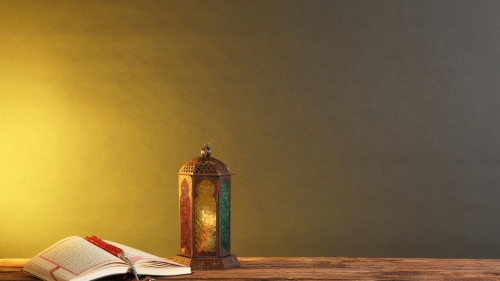Seeking Jannah (Paradise)

The world is a place to make choices. We are doing this every moment of our lives consciously or unconsciously, some choices leading to satisfaction while others not. We are responsible for the choices we make. But the most important choice is between Jannah (paradise) and Jahannam (hellfire) - between the pleasure and displeasure of Allah subhanahu wa ta'ala. Whether we are aware of it or not, we cannot evade making this choice. Those who desire Jannah need to make a conscious choice. One does not need to choose Jahannam: the failure to choose Jannah automatically results in that.
The seeker of Jannah must know that everything we do in this life has consequences not only in this world but also elsewhere, beyond the shores of this world, as well, where life is eternal. Everything we do in this world advances us in our slow and unseen but inevitable march to either Jannah or Jahannam. Even things that seem neutral in their effects are not so neutral. They distract our attention from that eternal goal and steal away our time and opportunity - the only capital we have - from investing where there is enduring benefit. This is an incalculable loss which we can never hope to make up.
Jannah is surrounded with hardships. Allah subnahu wa ta'ala calls it 'a steep ascent' (Al- Balad 90:11-12 ). Muhammad sallallahu alayhi wa sallam, the Messenger of Allah, has told us, "Jannah is surrounded by hardships and the Hell-Fire is surrounded by temptations" (narrated by Anas b. Malik, in Sahih Muslim). In yet another Hadith we hear him saying, "The world is a prison for the believer and a paradise for the unbeliever" (narrated by Abu Huraira, in Sahih Muslim). Earning Jannah requires the sacrifice of many allurements of the world, its comforts and advantages, all the things our base impulses goad us to seek. Because we are prone to falter and stray, and to panic at every threat around us, we need to steel our resolve to fight this constant and very hard battle. It would be tempting to give up Akhirah in order to secure this Duniya (earthly life). The seeker of the Akhirah and of the pleasure of Allah (swt), must remain wary of all the insistent promptings within his own heart, and the clever traps his own mind makes for him. He should beware of loving himself too much and taking "as his god his own vain desire", as warned against in the Qur'an (Al-Jathia 45:23).
Man is not a born sinner, but he is weak. He is forgetful and often lacks resolve. He is too willing to listen to the promptings of his lower nature, and heedless of the consequences. This was exactly what was demonstrated in the behavior of Adam (aws) and his wife Hawa (Eve). Allah (swt) says in the Qur'an: "We [took] the covenant of Adam, but he forgot, and We found on his part no firm resolve" (Ta Ha 20:115) Therefore, the first lesson that each human being needs to learn about himself is that he is weak, he can easily forget what is really important and his resolve may not be as strong as it needs to be. He needs to be constantly on his guard.
Following from this, the second lesson is that he cannot trust himself too much for there are enemies within himself. Iblis works in cooperation with these internal enemies. The seeker of the Akhirah needs to put all his trust in the guidance of Allah (swt) and firmly plant his feet in the path set for us by Muhammad (saws), the beloved Messenger of Allah (swt).
Thirdly, he needs to pray to Allah (swt) for His help. Even the prophets themselves were not too confident of themselves and they never slackened in seeking Allah's (swt) help. We can see this in this verse in the Qur'an, "O Lord... .let not our hearts deviate now after You have guided us, but grant us mercy from You, for You are the Giver of bounties without measure" (Al-'Imran 3:8). Our beloved Prophet (saws) never tired of making this prayer. The seeker of Akhirah needs to be humble, wise and strong in resolve.
The final lesson is to make tawba. We must nurture the habit of constantly making tawba (repentance) as soon as we realize that we have done wrong. We should not wait, not make excuses for ourselves. This was the difference between Adam (aws) and his wife on the one hand and Iblis (satan) on the other and it was this that made their destinies so different. We must make tawba not only when we are clearly wrong, but even when we detect the slightest weakness and wavering in ourselves. Even our best intentions and actions are bound to fall short of what they should be. There is also this to consider: we can never be sufficiently thankful to Allah (swt) for all the niyamah (blessings) of His that we enjoy in life. It is only through tawba that we can hope to make up for that deficiency. Thus we should be making tawba every moment of life.
We should never flatter ourselves that we have been or done our best. That is not ever going to happen in this world. There will always be room for improvement on our part. We can only aspire and try sincerely keeping the perfect model of Muhammad (saws) before our eyes and cry over our failure to reach his level of perfection. That is the most we can do and that is what Allah (swt) wants to see in us. He will extend His mercy and forgiveness - a promise He has made to every traveler on His path, a promise we can cling to in hope and thankfulness.
Is there then nothing in this world for the one who chooses Akhirah but trials and deprivations? Must he wait till the distant Akhirah to find any joy at all? Can he get nothing here and now? Alhamdulillah, he gets something here too - something to sustain him all through his life. He gets a clear sense of direction in this confusing and bewildering maze of life, his attention and energy are saved from being misspent on deception and falsehood, he is saved from being torn apart by all the calamities of life, and he gets the courage and confidence to persevere and keep moving on to his cherished goal. Most of all he gets a peace and contentment in the heart, something that is not bought and sold in the world's markets, but comes only as a gift from Allah (swt) alone and only the blessed can taste its sweetness. May Allah (swt) be merciful to us and include us in the company of the blessed.
*****
A. K. M. Mohiuddin is a retired university professor of English literature living in Bangladesh. He can be reached at this address: akmm45yahoo. com
Topics: Life Hereafter (Akhirah), Paradise (Jannah)
Views:22827
Related Suggestions
im v.happy whnevr i read d articles on this site,n this one is
extremely gud.thx to ppl like u,who help us follow path of islam
Highest or Loftiest of the Jannahs where all the Rivers of Paradise
originate.So therefore May Allah give us the real Yakeen which would
lead us to acquire the Jannatul Firdaus.Remember lots of efforts and
sacrifice are needed to achieve this lofty objective not only
wishful thinking which unfortunately is common among the Ummah due
to luck of Yakeen in the Akheerah(amaanee.If we recite Sayyadil
Istigfar Allahumma anta Rabbi Laila ha illa Anta Khalaqtani wa ana
abdika wa ana ala ahdika Wa waadika masta tatu abuu ulaka bi
niimatika alaiya wa abuu ubizambi fagfirli fa innahu laa yagfirur
zunuba illa anta.If one recites this dua in the morning with full
conviction and if he dies in the day he would surely go to
Jannah.Allahu Akbar.The same thing if one recites in the evening and
dies before the Morning with conviction he/she would go to Jannah.So
Alhamdu Lillahi we should make a habit to be reciting Sayyadil
Istigfar every day as no one knows when he/she is going to die but
we have to prepare every day.

















